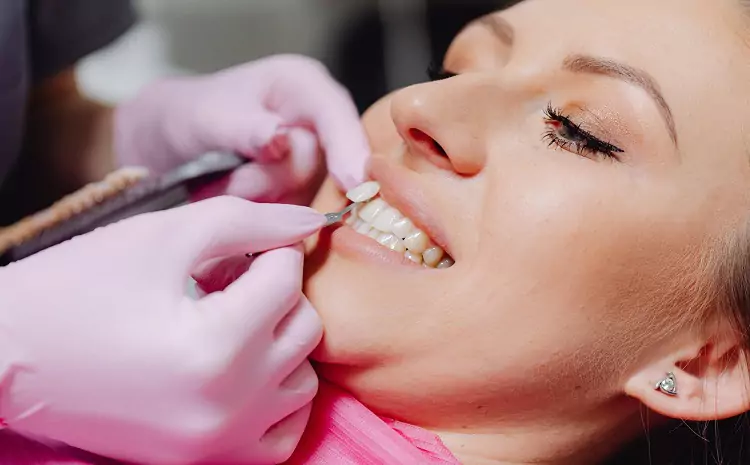Thinking about getting veneers? These thin, custom shells can transform your smile, fixing discoloration, chips, breaks, and slight alignment issues. But remember: not all veneers are the same. Each type has its perks and drawbacks. So, choose wisely for a dazzling smile!
Let’s explore and discuss the different types of veneers and their benefits and drawbacks.
Porcelain Veneers
Porcelain veneers are considered to be the gold standard in cosmetic dentistry. They are made from a high-quality, durable material that mimics the look and feel of natural teeth.
Porcelain veneers are custom-made to match the color and shape of your existing teeth. This makes them indistinguishable.
Highly Aesthetic
Porcelain veneers are known for their natural appearance. They can be color-matched to your existing teeth, giving you a seamless and beautiful smile.
Durable
Porcelain veneers are strong and long-lasting. This makes them a great investment for anyone looking to permanently improve the appearance of their teeth.
Stain-Resistant
Porcelain is non-porous and resistant to stains. This makes it an excellent option for people who consume staining beverages.
Irreversible
One of the major drawbacks of porcelain veneers is that they are a permanent dental treatment. To place them, a thin layer of enamel must be removed from the teeth.
This means that once you get porcelain veneers, you will always need them. So, it’s important to consult with a reputable service provider in your local area such as these cosmetic dental services in Lakeway. This will ensure that you are making the right decision.
Costly
Porcelain veneers are one of the most expensive types of veneers available. This makes them out of reach for many people.
Composite Veneers
Composite veneers are made from a tooth-colored resin material that is applied to the teeth and then hardened with a special light. Here are the pros and cons of composite veneers:
Affordability
Composite veneers are cheaper than porcelain veneers. This makes them a more budget-friendly option.
Reversible
Unlike porcelain veneers, composite veneers can be removed and replaced if desired. This makes them a good choice for those who may want to change the look of their teeth in the future.
Prone to Staining
The resin material used in composite veneers is more susceptible to staining. This means that when it comes to veneer maintenance, you may need touch-ups or replacements over time.
Less Durable
Composite veneers are not as strong as porcelain and may not last as long. They also have a higher chance of chipping or breaking.
Lumineers
Lumineers are even thinner than traditional porcelain veneers. They are about the same thickness as a contact lens and require little to no enamel removal from the teeth.
No Enamel Removal
One of the significant advantages of Lumineers is that they don’t need any enamel removal. This makes them a reversible option.
Durability
Despite their thinness, Lumineers are still strong and durable. They can last up to 20 years with proper care.
Limited Customization
Because of their ultra-thin design, Lumineers may not offer the same level of customization as traditional porcelain veneers.
Less Natural Appearance
Due to their thinness, Lumineers may not look as natural as traditional porcelain veneers. They may also appear bulkier.
Explore the Different Types of Veneers with this Guide
There are many types of veneers, each with its benefits and drawbacks. For dental veneers comparison, deciding on the right one for you depends on many factors. Consider your individual needs, budget, and desired outcome. Consulting with a reputable dentist can also help you make an informed decision.
Is this article helpful? Keep reading our blog for more.

Mark Thompson, a seasoned pest controller, is renowned for his expertise in keeping homes and businesses free from unwanted intruders. With a passion for environmental sustainability and a deep understanding of pest behavior, Mark has become a trusted authority in the industry.
